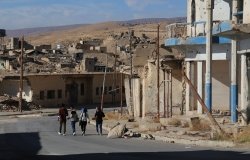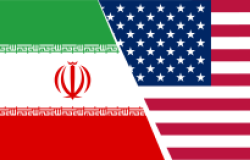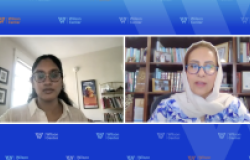Globalization, Islamization, and Female Employment Trends in Iran
Roksana Bahramitash, Simone de Beauvoir Institute, Concordia University.
Overview
In the context of three periods of Iranian history, Bahramitash discussed the evolution and nature of the women's political and cultural movement. In doing so, she challenged from a theoretical perspective what she sees as two common lenses through which scholars view women in Iran: 1) post-colonial theory, where Muslim women are victims and 2) an Orientalist cultural reductionism, which contextualizes the role of women in society in reference to Islam.
During the "Modernization Period" (1960-1979), Bahramitash explained, the Shah adopted a policy of Westernization, attempting to build a modern industrial economy. This was followed by the "Iranian Revolution" (1979-1997), during which social justice advanced at a more rapid pace. She credits this progress to the nationalization of many social programs (education, health care, insurance, etc...), the establishment of mosques as an acceptable place for women to learn and meet outside the home, and the need for a larger labor force during the Iran-Iraq War. Because much of the social work that women did during this time was on a volunteer basis, female integration was not properly reported. The Revolution brought with it social as well as religious optimism, specifically with regard to social justice, gender rights and inequality.
Following the end of the war and Ayatollah Khomeini's death, she noted, social progress slowed, principally due to the state's embrace of neo-liberal economic policies and the denationalization of social programs. For women, Bahramitash said, privatization and globalization were negative social forces in Iran. Many of the participants in the social progress movement felt abandoned. Furthermore, advances had failed to filter down to the lower economic and traditional working classes. Insufficient social and economic progress for women led to the birth of a disillusioned intellectual elite, which blamed the power structure and looked to reform.
The "Rise of the Reform Movement" (1997-present) witnessed the development of women as a political constituency, Bahramitash explained. The female intellectual elite attached its support to President Mohammed Khatami in return for his helping to foster the gender advocacy debate and instituting of socially progressive policies. Women played a crucial role in the political success of the reformists. The failure of this reform movement to unite the varying sides of Iranian society led to more disillusionment and the present conservative and religious backlash.
From a broader perspective, Bahramitash noted a simultaneous rise in poverty and improvement in many indicators of quality of life for women, including higher literacy and life expectancy and lower fertility rate and infant mortality. She sees the proliferation of non-governmental organizations (NGOs) as a sign of social progress, though economic liberalization has slowed the momentum of social justice. The failure of the reform movement was a setback on that front.
Drafted by Nathan Raab
Hosted By

Middle East Program
The Wilson Center’s Middle East Program serves as a crucial resource for the policymaking community and beyond, providing analyses and research that helps inform US foreign policymaking, stimulates public debate, and expands knowledge about issues in the wider Middle East and North Africa (MENA) region. Read more
Thank you for your interest in this event. Please send any feedback or questions to our Events staff.










